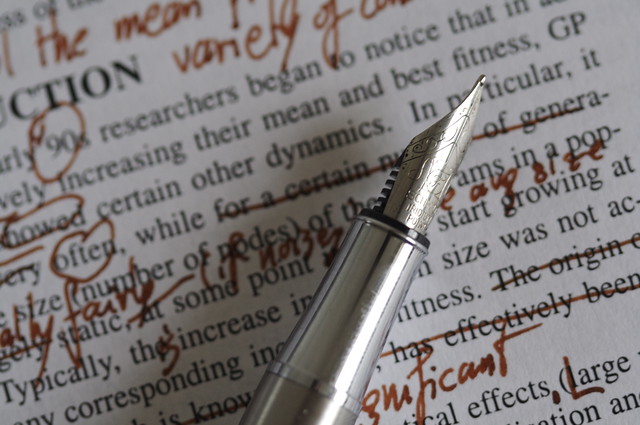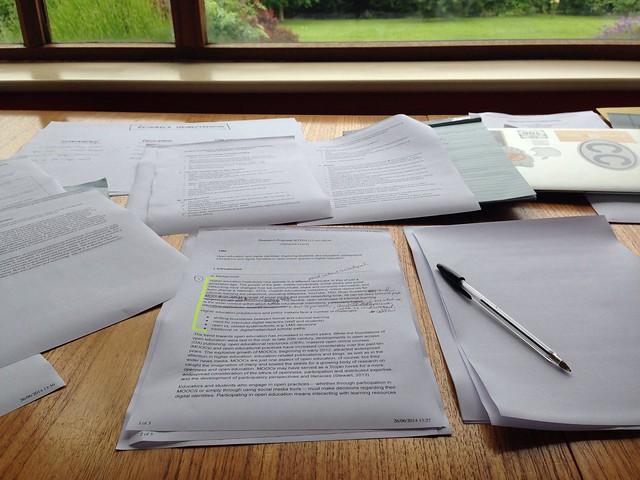Course objectives addressed: 1, 2, 3, 5, 6, 8, 9, 15
Even just thinking of the words research paper makes me cringe. I always dread writing any research paper because it’s very time consuming, a long process and I never know where to start. I always get slumped starting it because I don’t know where to begin. But even though I don’t enjoy writing research papers, doesn’t mean I never have. I have written many papers in my past and each time, I have learned something new. I started off by not having a clue of what to do, to learning new tricks along the way that has helped turn me into a better writer. I want to share with you my suggestions and advice on what actually makes a “good” research paper a good research paper.
The best place to start when writing that “good” research paper that you probably don’t care enough about, is your own interest on it. Alright, maybe you can’t even pick a topic that interests you at all but if you find one that stands out to you the most, then that is a start. Finding a topic that interests you will help to motivate you more when it comes to actually writing the whole paper because you will have more interest on it than if you picked a topic that you completely hated. Motivation is a big key in writing because once you get started, the only way from there is to finish it. This is a great first start because once you have your topic picked out, then you are ready to move onto the next step.
Picking out your resources would be the next thing to do. Resources are any type of source that you get your evidence from to support your information in your research paper. They can be websites, books, magazines, articles, encyclopedias, etc. It is always good to have factual information to back up your writing because it will attract more attention to the reader. If the reader sees that what you say is actually true because it has been cited in a source, then they will be likely to show more interest in your paper. Another reason picking out your sources is important is to have many options of where to get your information from. Most of the time, you can’t always find exactly what you’re looking for on just one website or book. Being able to have multiple resources will allow you to get more information on your topic and expand your writing.
Once you have chosen which resources you will use, you are ready to start your official outline. Most people think that outlines are a waste of time and not necessary, but has writing an outline ever hurt your writing? For me, outlines always helped improve my writing and thought process. Writing an outline is helpful because it allows you to jot down ideas that come to mind, make a layout of how you want to break up your long research paper and it also helps to know exactly what to look for in your resources. Personally, I love outlines because they are my savior in writing. I can’t ever think of a time where making an outline didn’t help improve my writing. This is a plan of what your paper will look like so take a advantage of using it because it does make everything a lot easier when it comes down to starting your paper.
CCBY Nic McPhee https://flic.kr/p/4zCtVk
The introduction is the opening sentence of any paper. This is where you open up to your reader by telling them what you will be talking about and what you will be arguing. The way to get your reader interested in your writing is by starting out with an engaging and powerful introduction to grasp their attention. Always remember that you must have a thesis statement, which is an argument that you will be talking about throughout your whole paper. Reading something with a boring opening paragraph doesn’t make anyone want to read it or make them interested in it at all. An article I read about on the meaning of dreams had a great first sentence that caught my attention very fast. “Dreams can be terrifying, erotic, bizarre or even banal. But what are dreams to the human mind?” Reading this made me want to read on because of how informative and descriptive it was. There were many verbs used such as terrifying, erotic, bizarre and banal which always will attract your reader in. Also the second sentence asking about what dreams are to the human mind will definitely attract attention because it engages the reader by asking them a question to make them really think about it. With a great thesis statement, a good use of verbs and well planned out introduction, you will be sure to have an outstanding introduction to your paper.
Now comes the big part. The big outlay of your paper where all of the information you have spent hours on researching and outlining, comes together. This is called the body of the paper. This is pretty much the whole paper, just without the introduction or conclusion part, which I will talk about later. All of the information you have broken up into paragraphs in your outline gets written in the body paragraph. All of your evidence and facts that you have taken notes on gets explained. This is where you inform your reader of what it is that you researched and what you have gathered while you researched it. Make sure you back up anything and everything that isn’t your own idea with a citation because you have to give credit where credit is needed. Also, make sure your body paragraphs flow nicely and are flowing together so that the reader doesn’t lose track of they are reading. Don’t be afraid of being too informative or sounding kind of boring in your body paragraphs because this is the most informative part of the paper. Backing up your facts with evidence from your sources and your own ideas on it will make your reader believe it more and show more interest in your information.
You have reached the easiest part of the paper by now. You got through the introduction and the long never-ending body portion of the paper. Can you guess what’s next? It’s the closing part of the whole paper also known as the conclusion. This is the final part of the research paper where you wrap it all up and restate your thesis. “While it’s now well established that dreams may be important for memory and learning, the way we learn during different phases of sleep is less clear.” The article shows a great example of a conclusion sentence with a twist that leaves the reader wondering and wanting to find out more. It draws back to the thesis statement by saying that dreams are important for memory and learning which shows your reader what you proved and argued in your paper. It also has a great ending saying that more experiments still must be done on the different phases of sleep. Doing this will assure your reader of what they read in your paper is factual, how you argued your thesis statement throughout and leave them wanting to find out more.
After finally finishing your paper, you can’t forget to include your works cited page that includes a list of all of your resources. It is always important to have this page because it shows exactly where you got your information from so that whoever is grading it knows where to look. This will help with not being accused of plagiarism, which is very important, and will also show that you are giving credit on information that is not your own. If you don’t know how to make a works cited page, I recommend a website that has always helped me with my citations. The Purdue Owl website has been my life saver for every paper I have written. It not only walks you through the steps of what to do when citing your paper, but it even helps with everything else such as writing your actual paper in any format style.
Some extra advice I have is to always look over your work. Even though you are completely done with writing your paper, you never know what mistakes you have if you don’t check. My suggestion is to print out what you have, read it over a couple of times, and highlight your mistakes. This will help you catch any spelling errors, grammar errors, missed citations and reassures you that everything you wrote makes sense. Looking over my work in the past has always helped me because I ended up making more mistakes than I thought I had. Another helpful suggestion is to have someone peer edit your work. Asking a friend, relative or a teacher to read over your work for you always helps too because they may catch something you didn’t or they may suggest making a change you didn’t think of before. Once you have made all of the necessary corrections to your paper and are happy with what you have, you are ready to print out the final hard copy.
Congratulations! Now it is time to hand in your paper. You didn’t think you would ever get to this point did you? Well you did it! You are confident that you made sure everything made sense, everything was cited properly, you had it peer edited, and you are content with your final paper. Your long hard work has finally finished and now you can breathe because you finished that long, time consuming research paper that you’ve been dreading since day one.
I hope that my advice has given you some ways to help you while you write your research paper. From my own personal experience, I can truly say that using all of the steps and suggestions I made throughout this post has really helped me in the past. I know that no one likes research papers because they are extremely annoying to write, but hey there comes a time when we all have to write one. I remember when I had to write my first research paper and I was so scared because I had no idea what to do. As I wrote more and more papers, each time I acquired a new skill that I did to help me write it. I put all of my skills together and I was able to write an A+ material paper for many of my classes. I will continue to keep using these skills for my future papers that I will write and I hope that you too will use my guidelines when you write your next good research paper.
CCBY catherinecronin https://flic.kr/p/nPX1Jy


I picture reading this as a 1st-year student: I think I would feel very soothed and supported! It’s like talking to a writing tutor who is determined to make the process less daunting. Very well organized, and just a really nice tone here that would make anyone feel more confident as they sit down to write.
LikeLike